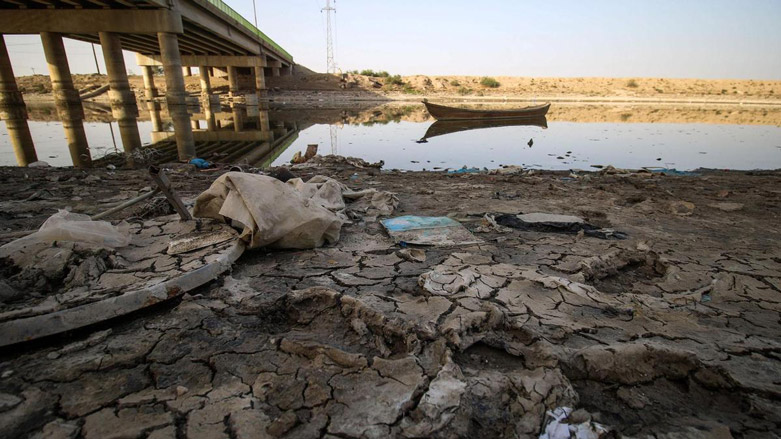Iraqis, Kurds plead on social media for Turkey, Iran to reverse water restrictions

ERBIL (Kurdistan 24) – People in Iraq and the Kurdistan Region took to social media to express their fear and anger toward the sudden drying up of rivers in the country, warning of the grave consequences of Turkey and Iran’s disastrous decisions.
Water flowing from Turkey and Iran to the Kurdistan Region and Iraq has reached alarmingly low levels in recent days, with Kurdish and Iraqi officials rushing to put forward efforts to avoid an impending water crisis.
This is happening upstream, now imagine the adverse effects this will have down stream, we see photos of Tigris drying up with small islands forming in the centre and even seen people walking across it. #iraq #العراق_عطشان pic.twitter.com/3OGXlwDxHo
— Moezx Al ?? ?? ?? (@moezx) June 4, 2018
The two neighboring countries’ newly-built dams have cut access to water flow upstream of the Tigris and Zab Rivers.
Water levels in Iraq have dropped by 40 percent over the past few years, a result attributed to the construction of water storage facilities in Turkey and Iran and irregular rainfall, Iraq’s Minister of Water Resource, Hassan al-Janabi, revealed on Sunday.
The water crisis in Iraq will firstly and most significantly affect those most vulnerable & already facing difficult circumstances pic.twitter.com/ckGHCuR1IK
— Yusra M. (@Temimi_Yusra) June 4, 2018
According to the Iraqi official, some seven million people in the country are expected to be directly affected by the water shortage.
Photos posted on social media show the advanced shrinkage of the Tigris River as well as signs of drought already becoming apparent in the south of Iraq.
In 2006, Turkey began constructing the Ilisu Dam on the Tigris River near its namesake village. It is one of 22 dams, part of the Southeastern Anatolia Project. The dam aims to prevent flooding, produce hydroelectric power, and preserve water.
Water Crisis Looming!#Turkey builds a new dam, withholds water, Tigris river hits a new low and millions of Iraqis could face famine!#Iraq pic.twitter.com/OKaRGgoh1o
— ??Iraq Live Update (@IraqLiveUpdate) June 3, 2018
On Saturday, Turkey announced the completion of the dam’s last phase.
Ilisu dam is expected to produce 1,200 megawatts of power and form a 10.4 billion cubic meter reservoir for Turkey.
Both #Iraq’s water and electricity are at an unprecedented terrible condition, exacerbated by Turkey and Iran’s dams built on the rivers that flow into Iraq. This summer is going to be a real hard one for the people of Iraq — plus the political and security challenges. pic.twitter.com/y3TpCZ6Plt
— Ari Mamshae (@Mamshae) June 3, 2018
That same day, Kurdish officials noted that neighboring Iran had restricted water flow to the cross-border Little Zab River, triggering a severe water shortage in the surrounding Kurdish towns.
Iraqis and Kurds alike rushed to Twitter to ask the UN to intervene and help prevent a water shortage.
We appeal to the United Nations and the international community to intervene immediately between Turkey and Iraq??because of the construction of Turkey dam Elissu, which causes the cutting of water from Iraq and the drought of the Tigris River
— وسام ?? (@Alnasreasde) June 4, 2018
#SaveTigris
#سد_اليسو
#تركيا
Others have ironically referenced the role the UN previously played in addressing humanitarian crises in Iraq, replacing the Oil-for-Food Program with ‘Oil-for-Water.’
Is Iraq ?? moving from Oil-for-Food Program towards Oil-for-Water Program? #WaterCrisis #iraq #SavetheTigris pic.twitter.com/Rny7pITfyN
— Saywan Abraham (@SaywanChomany) June 3, 2018
Other users stressed the disastrous impact the water crisis will have on agricultural lands, farming, and access to drinking water. “Neither human, animal, nor plant will survive from this calamity.”
#Turkey_kills_Iraq_by_water
— Abdalla Najim (@abdallaalshmari) June 4, 2018
سنخسر الالف المحاصيل الزراعية وستنفق الالف الحيوانات وتختفي مياه الشرب ..
لا انسان ولا حيوان ولا نبات سيسلم من هذه الكارثة . pic.twitter.com/5MzdOSkli0
Both Iranian and Turkish officials have expressed their readiness to cooperate with Iraq to address the issue, but the practical steps have yet to be taken.
Editing by Nadia Riva
